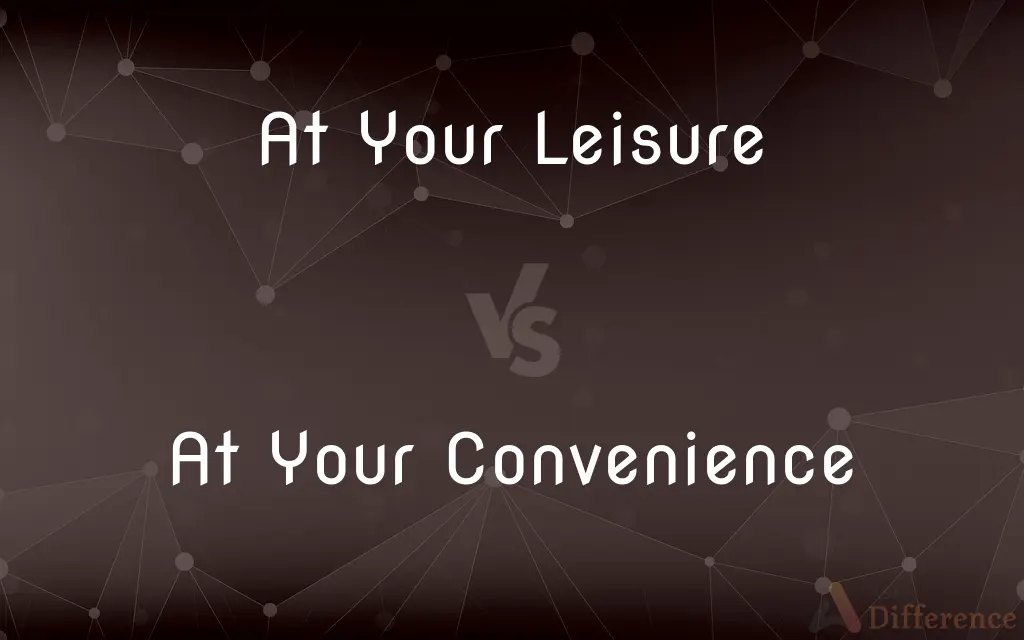At Your Leisure vs. At Your Convenience — What's the Difference?
Edited by Tayyaba Rehman — By Fiza Rafique — Published on November 17, 2023
"At Your Leisure" implies engaging in something without hurry, during free time. "At Your Convenience" suggests partaking whenever it suits one's schedule, prioritizing ease and feasibility.

Difference Between At Your Leisure and At Your Convenience
Table of Contents
ADVERTISEMENT
Key Differences
"At Your Leisure" conveys a notion of undertaking something when one desires, emphasizing relaxation and lack of urgency. Contrarily, "At Your Convenience" implies action when it suits one’s timetable, indicating a harmonization with existing plans and responsibilities without specifically emphasizing relaxation.
The phrase "At Your Leisure" usually symbolizes something to be undertaken during downtime, often enveloping a notion of pleasure or rest. "At Your Convenience", however, may align more with practicality, emphasizing the incorporation of an activity or task into one’s schedule without causing disruption.
While "At Your Leisure" could be seen as an encouragement to enjoy or take one's time, "At Your Convenience" might reflect more on a polite acknowledgment of one’s busy schedule, offering flexibility and consideration toward their time management and responsibilities.
Comparison Chart
Implied Time Frame
May suggest ample time
Suggests whenever possible
Focus
Leisure and enjoyment
Suitability and practicality
ADVERTISEMENT
Urgency
Low urgency
Neutral regarding urgency
Implied State
Relaxed, unhurried
Methodical, organized
Emphasis
Enjoyment and downtime
Effortlessness in fitting into one’s schedule
Compare with Definitions
At Your Leisure
Partaking in activities during free time.
Visit the museum exhibitions at your leisure over the weekend.
At Your Convenience
Involvement when it’s most fitting or feasible.
Attend the webinar at your convenience, selecting a time that works best.
At Your Leisure
Involving oneself when one chooses.
Explore the online courses at your leisure, selecting topics that interest you.
At Your Convenience
Engaging in something when it suits one’s schedule.
Please sign the documents at your convenience before Friday.
At Your Leisure
Unhurried involvement in an activity.
Peruse the market stalls at your leisure, taking time to enjoy each one.
At Your Convenience
Partaking whenever most opportune.
Review the proposals at your convenience, ensuring no disruption to your plans.
At Your Leisure
Participating when one desires.
Listen to the podcasts at your leisure, choosing your preferred episodes.
At Your Convenience
Engaging without causing disruption.
Kindly provide feedback at your convenience, respecting your existing commitments.
At Your Leisure
Engaging in something with no rush.
Read the document at your leisure, absorbing every detail.
At Your Convenience
Participation when most practical.
Complete the survey at your convenience, when it won’t intrude upon your work.
Common Curiosities
Is "At Your Leisure" used for official or critical tasks?
Rarely, as it suggests a lack of urgency and is often used in more relaxed or non-pressured contexts.
Does "At Your Leisure" imply enjoyment?
Often, yes. It usually implies engaging in something without haste, potentially enhancing enjoyment.
Can "At Your Convenience" apply to leisure activities?
Yes, "At Your Convenience" can apply to any activity where the timing is left to the individual’s choice.
Can "At Your Convenience" infer immediate action?
No, "At Your Convenience" generally suggests action when it fits the individual’s schedule, without urgency.
Can "At Your Convenience" imply a deadline?
It doesn’t inherently imply a deadline but may be used within contexts where a deadline is present or understood.
Does "At Your Leisure" express formality?
Not specifically. It’s a neutral phrase that leans towards informality due to its association with relaxation and leisure.
Does "At Your Leisure" imply no time limit?
Generally, "At Your Leisure" implies no rush but not necessarily an unlimited timeframe.
Is "At Your Leisure" professional?
It may be used in professional contexts but tends to be informal and is more common in casual communication.
Is "At Your Convenience" strictly formal?
No, it can be used in both formal and informal contexts, offering a polite means to suggest flexible engagement.
Does "At Your Leisure" infer any obligation?
It tends to carry a light, non-obligatory tone, suggesting engagement when one wishes to.
Can "At Your Convenience" be considered polite?
Yes, "At Your Convenience" is often used to express politeness and consideration of someone’s time.
Does "At Your Convenience" imply an obligation?
Not directly. It suggests that action should be taken when suitable but doesn’t express obligation or pressure.
Share Your Discovery

Previous Comparison
Bundle of His vs. Purkinje Fibres
Next Comparison
Mild Steel vs. Galvanized IronAuthor Spotlight
Written by
Fiza RafiqueFiza Rafique is a skilled content writer at AskDifference.com, where she meticulously refines and enhances written pieces. Drawing from her vast editorial expertise, Fiza ensures clarity, accuracy, and precision in every article. Passionate about language, she continually seeks to elevate the quality of content for readers worldwide.
Edited by
Tayyaba RehmanTayyaba Rehman is a distinguished writer, currently serving as a primary contributor to askdifference.com. As a researcher in semantics and etymology, Tayyaba's passion for the complexity of languages and their distinctions has found a perfect home on the platform. Tayyaba delves into the intricacies of language, distinguishing between commonly confused words and phrases, thereby providing clarity for readers worldwide.













































